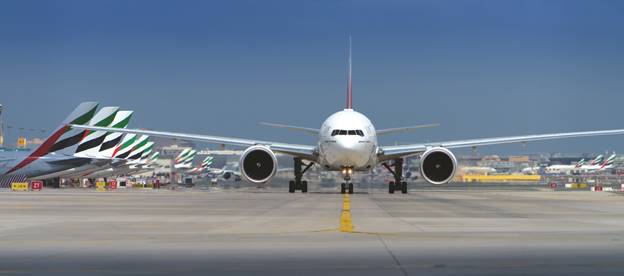
The Emirates Group has announced its 31st consecutive year of profit and steady business expansion.
The Emirates Group posted a profit of AED 2.3 billion ($ 631 million) for the financial year ended 31 March 2019, down 44 per cent from last year.
The Group’s revenue reached AED 109.3 billion ($ 29.8 billion), an increase of 7 per cent over last year’s results. The Group’s cash balance was AED 22.2 billion ($ 6.0 billion), down 13 per cent from last year mainly due to large investments into the business, including significant acquisitions and payment of last year’s AED 2 billion ($ 545 million) dividend.
In line with the overall profit, the Group declared a dividend of AED 500 million ($ 136 million) to the Investment Corporation of Dubai for 2018-19.
Chairman and Chief Executive, Emirates Airline and Group, His Highness (H.H.) Sheikh Ahmed bin Saeed Al Maktoum said, “2018-19 has been tough, and our performance was not as strong as we would have liked. Higher oil prices and the strengthened US dollar eroded our earnings, even as competition intensified in our key markets. The uptick in global airfreight demand from the previous year appears to have gone into reverse gear, and we also saw travel demand weaken, particularly in our region, impacting both dnata and Emirates.
“Every business cycle is different, and we continue to work smart and hard to tackle the challenges and take advantage of opportunities. Our goal has always been to build a profitable, sustainable, and responsible business based in Dubai, and these principles continue to guide our decisions and investments. In 2018-19, Emirates and dnata delivered our 31st consecutive year of profit, recorded growth across the business, and invested in initiatives and infrastructure that will secure our future success.”
Emirates explained that in 2018-19, the Group collectively invested AED 14.6 billion ($ 3.9 billion) in new aircraft and equipment, the acquisition of companies, modern facilities, the latest technologies, and staff initiatives, a significant increase over last year’s investment spend of AED 9.0 billion ($ 2.5 billion).
In February, Emirates announced a commitment for 40 A330-900s and 30 A350-900s worth US$ 21.4 billion at list prices in an agreement signed with Airbus, to be delivered from 2021 and 2024 respectively. The airline will also receive 14 more A380 deliveries from 2019 until the end of 2021, taking its total A380 order book to 123 units.
dnata’s key investments during the year included: the acquisitions of Q Catering and Snap Fresh in Australia, and 121 Inflight Catering in the US; the buy-out of shares to become the owner of Dubai Express, Freightworks LLC; and a 51% majority stakeholder of Bolloré Logistics LLC, UAE; the build of new cargo and pharma handling facilities in Belgium, the US, the UK, the Netherlands, Australia, Singapore and Pakistan; the acquisition of German tour operator Tropo, and a majority stake in BD4travel, a company providing artificial intelligence driven IT solutions in the travel sector.

Across its more than 120 subsidiaries, the Group’s total workforce increased by two per cent to 105,286, representing over 160 different nationalities, mainly influenced by dnata’s new acquisitions and its international business expansion.
Sheikh Ahmed said, “In 2018-19, we were steadfast with our cost discipline while expanding our business and growing revenues. By slowing the recruitment of non-operational roles, and implementing new technology systems and new work structures, we’ve improved productivity and retarded manpower cost increases.”
“It’s hard to predict the year ahead, but both Emirates and dnata are well positioned to navigate speed bumps, as well as to compete and succeed in the global marketplace. We must continually up our game, that’s why we invest in our people, technology, and infrastructure to help us maintain our competitive edge. As a responsible business, we also invest resources towards supporting communities, conservation and environmental initiatives, as well as incubating talent and innovation that will propel our industry in the future,” he added.
Emirates’ total passenger and cargo capacity crossed the 63 billion mark, to 63.3 billion ATKMs at the end of 2018-19, cementing its position as the world’s largest international carrier. The airline moderately increased capacity during the year over 2017-18 by 3 per cent, with a focus on yield improvement.
Emirates received 13 new aircraft during the financial year, comprising of seven A380s and six Boeing 777-300ERs, including the last 777-300ER on its order book. The next 777 delivery is planned for 2020, when Emirates receives its first 777X aircraft.
During 2018-19, Emirates phased out 11 older aircraft, bringing its total fleet count to 270 at the end of March. This fleet roll-over involving 24 aircraft was again one of the largest managed in a year, keeping Emirates’ average fleet age at a youthful 6.1 years.






